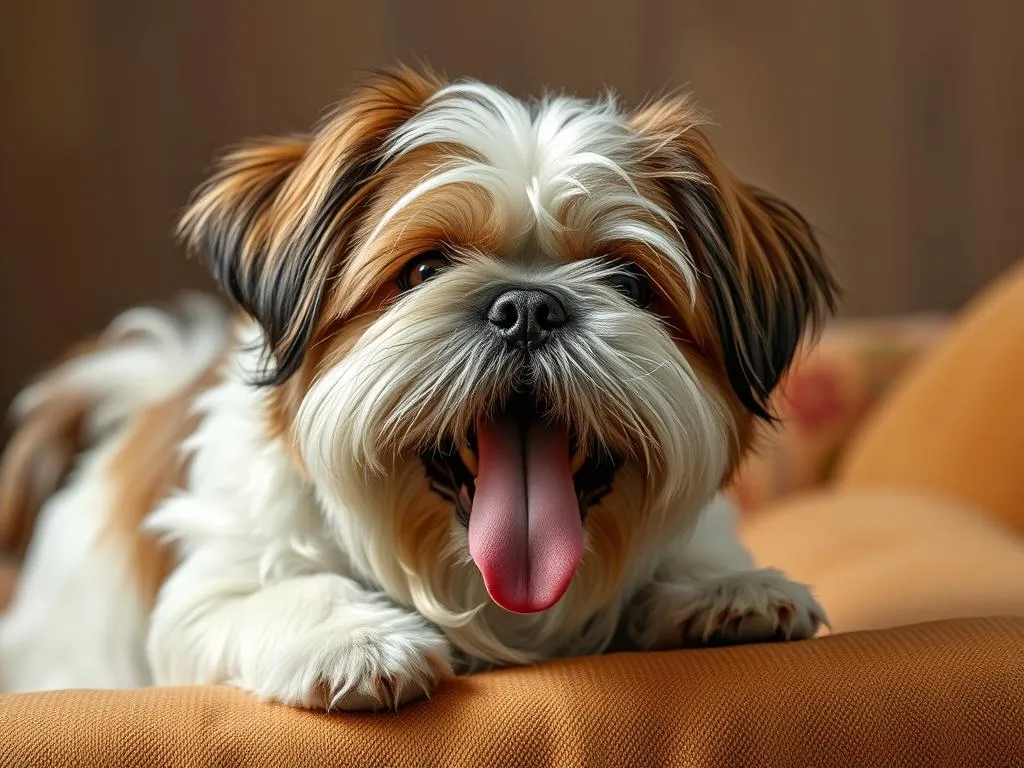
Understanding why your Shih Tzu is panting so much can be crucial for their health and well-being. Panting is a common behavior in dogs, but it can mean different things depending on the context. Shih Tzus, with their unique physiology, may exhibit panting behaviors more frequently than other breeds. It’s essential to differentiate between normal panting and signs that may indicate a health concern. Consulting a veterinarian is always advisable if you have any worries about your dog’s health.
Understanding Normal Dog Behavior
What is Panting?
Panting in dogs is a rapid, shallow breathing pattern that helps them cool down and regulate their body temperature. While panting is a normal behavior, it can become concerning when it appears excessive or is accompanied by other symptoms. Normal panting occurs after exercise or in warm environments, while abnormal panting may happen at rest or for extended periods without a clear reason.
Why Do Dogs Pant?
Dogs pant for several reasons:
-
Thermoregulation: Dogs do not sweat like humans. Instead, they rely on panting to cool down. The evaporation of moisture from their tongue and respiratory tract helps reduce their body temperature.
-
Emotional responses: Stress, excitement, or anxiety can also cause panting. A dog may pant when they are nervous or stimulated, indicating an emotional state that needs addressing.
-
Physical exertion: After vigorous play or exercise, dogs naturally pant to catch their breath and cool down.
Specific Reasons for Excessive Panting in Shih Tzus
Breed Characteristics
Shih Tzus belong to a group of breeds known as brachycephalic dogs, characterized by their short, flat faces. This unique anatomy can affect their breathing, making them more prone to respiratory issues. Because of their compressed airways, Shih Tzus often have to work harder to breathe, which can lead to more frequent panting, especially in stressful or hot situations.
Environmental Factors
Shih Tzus are particularly vulnerable to temperature extremes.
-
Heat sensitivity: Due to their thick fur and brachycephalic structure, Shih Tzus can easily overheat. Panting serves as their primary means of cooling down, which may explain why your Shih Tzu is panting so much during warmer months or after being outside for too long.
-
Seasonal effects: Changes in weather can also influence panting behavior. In the summer, you might notice increased panting, while during colder months, they may pant less frequently but still do so if they become overly excited or stressed.
Health Issues
Excessive panting could be a sign of underlying health problems in your Shih Tzu. Some common conditions include:
-
Respiratory problems: Brachycephalic obstructive airway syndrome (BOAS) is prevalent in Shih Tzus and can lead to excessive panting due to restricted airflow.
-
Heart conditions: Heart disease can manifest as increased panting, especially during rest. An irregular heartbeat or heart murmur might accompany this symptom.
-
Pain or discomfort: If your Shih Tzu is in pain, they may pant excessively. Observing their behavior for other signs of discomfort, such as whining or reluctance to move, can help pinpoint the issue.
-
Other medical conditions: Allergies, infections, and metabolic disorders (like Cushing’s disease) can also lead to increased panting. Monitoring your dog’s overall health and behavior is crucial in identifying potential problems.
When to Be Concerned About Panting
Signs of Abnormal Panting
If you notice your Shih Tzu panting excessively, keep an eye out for these signs:
-
Frequency and duration: If panting occurs frequently and lasts longer than usual, it may be a cause for concern.
-
Accompanying symptoms: Look for signs like lethargy, vomiting, coughing, or difficulty breathing. These could indicate a more serious health issue.
Situational Awareness
Understanding the context of your dog’s panting can help you determine whether it’s a normal reaction or something to worry about:
-
Panting after exercise: It’s standard for dogs to pant after physical activity. However, if the panting continues long after resting, check for other symptoms.
-
Panting at rest: If your Shih Tzu is panting while lying down and appears relaxed, it might be a sign of a health issue, especially if it’s out of character for them.
What to Do If Your Shih Tzu is Panting Excessively
Immediate Steps to Take
If your Shih Tzu is panting excessively, consider the following immediate actions:
-
Assessing the environment: Ensure your dog is in a cool, shaded area. Offer them fresh water and consider using a fan or cooling pad to help lower their body temperature.
-
Monitoring behavior: Keep track of your dog’s panting patterns. Note when it occurs, how long it lasts, and any associated symptoms. This information will be helpful when discussing concerns with your veterinarian.
Consulting a Veterinarian
If panting is accompanied by other concerning symptoms or persists beyond typical situations, it’s essential to consult a veterinarian.
-
When to seek professional help: If your Shih Tzu displays signs of distress, such as difficulty breathing, lethargy, or a change in appetite, contact your vet immediately.
-
Information to provide during a vet visit: Be prepared to share details about your dog’s health history, recent changes in behavior, and any specific incidents that may have preceded the panting.
Home Care and Management
Managing excessive panting at home may involve:
-
Hydration and temperature control: Always provide fresh water and ensure your dog has access to cool environments, especially during hot weather.
-
Regular vet check-ups: Routine health assessments can help catch any underlying issues early on.
Prevention and Maintenance of Dog Health
Regular Health Check-ups
Routine veterinary visits are crucial for maintaining your Shih Tzu’s health. Regular check-ups can help detect any health issues early, providing better management options.
Maintaining a Healthy Lifestyle
A balanced diet and proper exercise are essential for your Shih Tzu’s overall well-being:
-
Diet and nutrition: Consult with your veterinarian to determine the best diet for your Shih Tzu. Feeding them high-quality dog food can help prevent obesity and related health issues.
-
Exercise: Engage your Shih Tzu in appropriate physical activity. Short, frequent walks and play sessions are often better than long, strenuous exercise, especially for this breed.
Stress Management
Identifying and mitigating stressors in your Shih Tzu’s environment can significantly reduce anxiety-induced panting:
-
Identify triggers: Pay attention to what causes your dog stress, whether it’s loud noises, unfamiliar situations, or other pets.
-
Calming techniques: Utilize calming methods such as soft music, a comfortable resting area, or even anxiety wraps designed to soothe anxious dogs.
Conclusion
Understanding why your Shih Tzu is panting so much is essential in ensuring their health and happiness. While panting can be a normal behavior, it’s vital to monitor your dog for excessive panting and accompanying symptoms. Proactively managing your pet’s health through regular veterinary care, proper nutrition, and stress management can help prevent potential issues. Always remember that when in doubt, consulting a veterinarian is the best course of action to ensure your beloved Shih Tzu remains healthy and happy.









